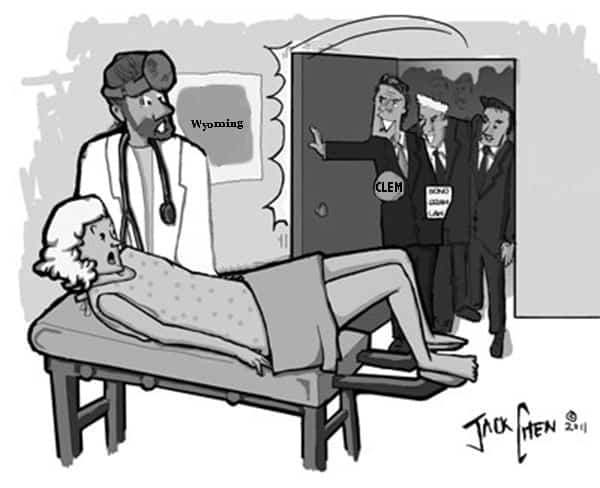Two anti-abortion bills before the Wyoming State Legislature were considered on Monday. One was defeated, while the other advanced.
Senate File 128 was a “fetal personhood” bill that would have granted legal rights to zygotes, fertilized eggs, clumps of fetal tissue, and any form of pregnancy that had not been brought to term. It was voted down in the Senate, 11 – 17.
House Bill 103 would penalize doctors who fail to report in-depth details about abortions they perform. It passed its first reading in the House.
Meanwhile, House Bill 103, which would require a 48-hour waiting period for women to receive abortions, passed the House last week and has been referred to the Senate Health and Labor Committee.
Lawmakers choose current, “surgically crafted” bill over muddled mess
The sponsors of both these bills claimed that they had nothing to do with the controversy over reproductive rights. In the case of HB-103, this may have worked to its advantage.

During debate over SF-128, however, it became clear that the sponsor, Sen. Lynn Hutchings (R-Cheyenne), might have been better off trying to sell her proposal as a straightforward anti-abortion bill.
Instead, Hutchings claimed that her bill, the “Unborn victims of violence act,” had nothing to do with abortion. She said that she brought the bill out of desire to help a fellow legislator whose pregnant daughter had been killed. SF-128 would have created a host of new crimes against “unborn children,” along with stiff penalties.
The problem, as Sen. Tara Nethercott (R-Cheyenne) explained, was that Wyoming already has “profound, surgically crafted” laws that function as a “hammer” against people who harm pregnant women. Laws that would bring the “unborn child” into the equation would only cause confusion in the courts and potentially weaken protections for victims.
Sen. Michael Von Flatern (R-Gillette) said that a county coroner he’d asked about the bill agreed. The coroner, Von Flatern said, explained that the law would potentially require additional autopsies for the “unborn child,” and that proving the cause of death would be complicated, at best.
Sen. Bill Landen (R-Casper) said Wyoming already has good laws in place to deter violence against pregnant women. He wondered whether, under SF-128, someone who was at fault in a car accident that caused the other driver to miscarry would face 20 years in prison for criminal negligence.
Hutchings faltered in her attempts to counter these arguments. She promised to bring amendments on the bill’s second reading to alleviate her colleagues’ concerns.
But her colleagues weren’t having it. They voted the bill down.
Reporting penalties for doctors moves forward
Rep. Scott Clem (R-Gillette) had much better luck convincing his fellow House members that HB-103 is just an innocent means of collecting abortion data.
In its original form, the bill would have levied fines and even jail time against doctors who failed to report the race, ethnicity, marital status, and other information about women who receive abortions, and about the gestational age of the fetus and the type of procedure performed.

The House Committee on Labor and Health amended the bill last week so that the Wyoming Board of Medicine would issue penalties against doctors, rather than the criminal justice system.
But Rep. Shelly Duncan (R-Lingle) wondered why we would go after doctors in this manner at all. We don’t treat the reporting of other medical procedures like this.
In his speech to introduce the bill, Clem claimed that HB-103 protects women’s privacy, since the reports about abortion would not be subject to a Freedom of Information Act request.
But, Duncan said, the CDC would report this information back to the counties from which it originated, describing in-depth demographic details about “anonymous” women who received abortions. In small towns like Lingle, it wouldn’t be hard for someone to look at the data and figure out who it was talking about, she said.
Not to worry, Rep. Sue Wilson (R-Cheyenne) said. Lots of other types of pregnancy-related information is reported to the CDC—like whether a mother breastfeeds or uses tobacco—as though those bits of information have been used by “pro-life” fanatics to threaten and harass women and to kill doctors.
After hearing debate, members of the House decided they, in fact, wouldn’t worry about it. HB-103 passed first reading Monday and second reading on Tuesday, and it seems as though it will soon be the Senate’s concern.

